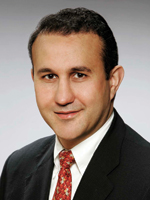Delaware Disbars Pennsylvania Lawyer
The Bencher—January/February 2018
By Francis G.X. Pileggi, Esquire

 The Delaware Supreme Court in a recent decision disbarred an out-of-state lawyer who had been admitted pro hac vice in Delaware litigation. When applied to an attorney not admitted in the state, Delaware’s high court explained that disbarment means the unconditional exclusion from the admission to, or the exercise of any privilege to, practice law in the state.
The Delaware Supreme Court in a recent decision disbarred an out-of-state lawyer who had been admitted pro hac vice in Delaware litigation. When applied to an attorney not admitted in the state, Delaware’s high court explained that disbarment means the unconditional exclusion from the admission to, or the exercise of any privilege to, practice law in the state.
This recent decision involved a Pennsylvania lawyer who was admitted pro hac vice to represent a Delaware doctor in a Delaware medical malpractice action. The disbarment stemmed from the lawyer’s intentional misconduct that included the failure to disclose altered medical records and the failure to correct his client’s false testimony.
The Delaware Supreme Court adopted the findings of the Board on Professional Responsibility, which concluded that the lawyer’s actions were “at best dishonest and at worst criminal [and] resulted in actual and potential harm to the litigants, the judicial process and the public.”
The specific Delaware Rules of Professional Conduct that were violated included Rules 3.3(b); 3.4(a); 3.4 (c); 4.1(b); 8.4(c); and 8.4(d)—based on the following findings: (1) failure to take reasonable remedial measures by failing to disclose to the tribunal the criminal and/or fraudulent conduct of the client; (2) unlawfully concealing a material document having potential evidentiary value; (3) failing to disclose a material fact when disclosure was necessary to avoid assisting a fraudulent act by a client; (4) engaging in conduct involving dishonesty, fraud, deceit or misrepresentation by failing to provide the relevant documents to the opposing party or the tribunal; and (5) by engaging in conduct that was prejudicial to the administration of justice by failing to disclose material documents.
The specific factual background involved the alteration of medical records by a medical doctor regarding the condition of the patient. This was a central issue in the medical malpractice case against the medical doctor. The medical doctor and her staff changed the treatment notes to alter the description of the actual condition of the patient, as well as what follow-up advice the medical doctor had given to the patient.
It was not until a subsequent lawsuit against the attorney representing the medical doctor for bad faith and legal malpractice took place, that both the existence of the altered medical records and the failure to produce them during the medical negligence litigation was first uncovered.
The altered medical records were of significant evidentiary value and had a substantial impact on the amount of the jury verdict. The medical doctor testified at her deposition that the office records produced in her discovery were complete, even though they did not include the altered records that she had reviewed with her counsel. The medical doctor also testified, both in her deposition and at trial, that she had not reviewed anything other than the documents that had been produced.
The disbarred attorney did not correct the false deposition testimony, nor did he correct the false trial testimony. It was also a violation of the Rules of Professional Conduct for the disbarred attorney not to supplement discovery responses—by failing to disclose the altered medical records. It was also a failure of his ethical obligation not to notify the opposing counsel and the court about the fraudulent actions and the false testimony of his client.
The rule involved in this case with the most widespread applicability to general litigation is Rule 3.3(b), which subjects lawyers to penalties if they fail to take reasonable remedial measures by failing to disclose to the tribunal, any litigation-related criminal and/or fraudulent conduct of a client. In this case, that rule was violated based on the awareness of the attorney of medical records that were altered by his client, and allowing his client to testify falsely during her deposition and at trial without disclosing that fraud and falsity. Moreover, and similarly, Rule 3.4(a) makes it unlawful to conceal a material document having potential evidentiary value by failing to disclose the existence of such a document. In this context, concealment is defined as failing to disclose.
Although less likely to be encountered by most lawyers, also important is the requirement that a lawyer disclose a material fact when disclosure is necessary to avoid assisting a fraudulent act by a client. As applied to this case, the attorney violated Rule 4.1(b) by failing to disclose the existence of altered medical records, which was a material fact in the medical malpractice action where the care provided was the central issue in the case. Failing to disclose the existence of the material medical records with obvious evidentiary value was also a violation of Rule 8.4(d), which provides that it is professional misconduct for a lawyer to engage in conduct that is prejudicial to the administration of justice. Failure of a lawyer to disclose documentation that he knows to be of material evidentiary value is prejudicial to the administration of justice.
Disbarment is an appropriate penalty generally when a lawyer engages in intentional misconduct involving dishonesty, fraud, deceit or misrepresentation that seriously and adversely reflect on the ability of the lawyer’s fitness to practice. There are 11 aggravating factors and 13 mitigating factors that the court considers in connection with its analysis of this issue, none of which helped the attorney involved avoid disbarment.
In closing, the court cited two decisions in other jurisdictions that found disbarment to be appropriate when lawyers intentionally concealed evidence and assisted their clients with testifying falsely. The conclusion reached in this case was also supported by the grave violations of the standards of conduct that must be upheld in the legal profession.
Francis G.X. Pileggi, Esquire is the member-in-charge of the Wilmington, Delaware, office of Eckert Seamans Cherin & Mellott, LLC. He summarizes key corporate and commercial decisions of Delaware Courts, and addresses legal ethics, at www.delawarelitigation.com.
© 2018 Francis G.X. Pileggi, Esquire. This article was originally published in the January/February 2018 issue of The Bencher, a bi-monthly publication of the American Inns of Court. This article, in full or in part, may not be copied, reprinted, distributed, or stored electronically in any form without the written consent of the American Inns of Court.